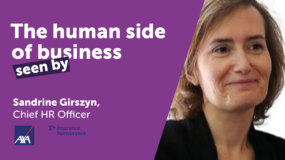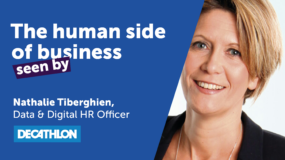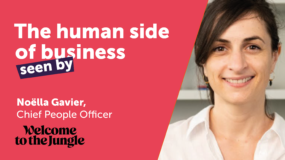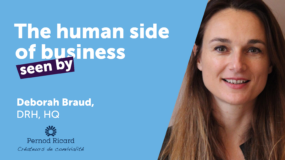Human resources management: insights from Déborah Braud, HQ HRBP at Pernod Ricard SA
Here is our first edition of “The human side of business as seen by…”, a series of monthly interviews that gives a voice to those for whom resources are above all human. Whether they are HR, managers, business leaders or researchers, they all share with us their vision of the working world and its transformations.
In this first interview, we had the pleasure of interviewing Déborah Braud, , HQ HR Director at Pernod Ricard SA, who was a speaker in our webinar « Organizational Design: How best to marry business vision and human approach? The example of Pernod Ricard » in December 2020. We took the opportunity to discuss her background, the changing role of HR and the place of the human factor in corporate transformations.
What is your relationship with HR? How did you become HR Director? In short, what is your career path within HR?
I have a master’s degree in HR that I obtained at Celsa. I then worked for 20 years in this field, first at L’Oréal and, after a stint in HR consulting at Bearing Point, I have joined Pernod Ricard.
During these experiences, I was both in generalist positions, as HRBP and HRD in international environments (expatriation in Central Europe) on various perimeters (sales/product development subsidiaries and headquarters), but also in expert positions, particularly in Talent Acquisition and Learning.

The Covid crisis has revealed to us how determining is the adaptability of employees in the resilience and performance of organizations.
From your point of view, what human challenges do businesses face today? Is the human element sufficiently taken into account?
Companies are increasingly confronted with permanent change in volatile and uncertain environments. The Covid crisis has revealed to us how determining is the adaptability of employees in the resilience and performance of organizations.
One of the main challenges for companies today is therefore to ensure that all stakeholders are engaged in the change process. Leadership must provide them with sufficient meaning and vision of the transformation and involve the various stakeholders much further upstream to co-construct the conditions for success.
This necessarily involves in-depth listening and constant dialogue. This will enable companies to identify the benefits of change for each of the stakeholders, and to remove potential obstacles to be able to adjust throughout the project.

The HR function is faced with various challenges in order to reconcile organizational efficiency and employee fulfillment.
What is your vision of today’s HR?
The HR function is faced with various challenges to reconcile organizational efficiency and employee fulfillment.
HR must not only deliver a service of operational excellence on day-to-day priorities for employees and managers, but also anticipate the skills of tomorrow for the company, retain talent by personalizing support and maximizing the use of data, build an attractive and modern work environment that integrates new ways of working, and communicate more about the value proposition for employees.
Beyond these fundamental missions, HR plays a major role in the transformation of organizations. They question the challenges of change, support managers in the change management process and ensure that the conditions are in place to support employee commitment.
What changes will the HR function undergo in the future and what skills it should develop tomorrow?
The HR function is probably one of the functions that has evolved the most significantly since its creation in the 1960s and 1970s, moving from a very “administrative” role with Personnel Directors to HR Business Partner roles.
This evolution requires HR talents to activate a very broad range of skills: sharp and varied HR expertise skills (learning, recruitment, talent assessment, talent coaching, compensation & benefits, social relations, etc.) and generalist skills, combined with an understanding of the business and the field. It is a job that also requires a fine knowledge of oneself, maturity, and relational agility in order to be at the service of others.
And finally, in addition to these skills and know-how, tomorrow’s HR professionals will need to develop the ability to activate and alternate two positions that may appear to be antagonistic: that of a company representative to manage the framework and processes, and that of a coach for all the talent in the organization.



